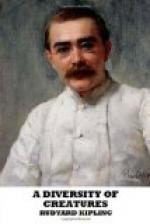[Footnote 4: “The Captive”: Traffics and Discoveries.]
He guided me, hand on shoulder, into a babble of high-pitched talk and laughter that filled a vast drawing-room. He introduced me as the founder of the family fortunes to a little, lithe, dark-eyed woman whose speech and greeting were of the soft-lipped South. She in turn presented me to her mother, a black-browed snowy-haired old lady with a cap of priceless Venetian point, hands that must have held many hearts in their time, and a dignity as unquestioned and unquestioning as an empress. She was, indeed, a Burton of Savannah, who, on their own ground, out-rank the Lees of Virginia. The rest of the company came from Buffalo, Cincinnati, Cleveland and Chicago, with here and there a softening southern strain. A party of young folk popped corn beneath a mantelpiece surmounted by a Gainsborough. Two portly men, half hidden by a cased harp, discussed, over sheaves of typewritten documents, the terms of some contract. A knot of matrons talked servants—Irish versus German—across the grand piano. A youth ravaged an old bookcase, while beside him a tall girl stared at the portrait of a woman of many loves, dead three hundred years, but now leaping to life and warning under the shaded frame-light. In a corner half-a-dozen girls examined the glazed tables that held the decorations—English and foreign—of the late Lord Marshalton.
‘See heah! Would this be the Ordeh of the Gyartah?’ one said, pointing.
’I presoom likely. No! The Garter has “Honey swore”—I know that much. This is “Tria juncta” something.’
‘Oh, what’s that cunning little copper cross with “For Valurr"?’ a third cried.
‘Say! Look at here!’ said the young man at the bookcase. ’Here’s a first edition of Handley Cross and a Beewick’s Birds right next to it—just like so many best sellers. Look, Maidie!’
The girl beneath the picture half turned her body but not her eyes.
‘You don’t tell me!’ she said slowly. ’Their women amounted to something after all.’
‘But Woman’s scope, and outlook was vurry limmutted in those days,’ one of the matrons put in, from the piano.
’Limmutted? For her? If they whurr, I guess she was the limmut. Who was she? Peters, whurr’s the cat’log?’
A thin butler, in charge of two footmen removing the tea-batteries, slid to a table and handed her a blue-and-qilt book. He was button-holed by one of the men behind the harp, who wished to get a telephone call through to Edinburgh.
‘The local office shuts at six,’ said Peters. ’But I can get through to’—he named some town—’in ten minutes, sir.’
’That suits me. You’ll find me here when you’ve hitched up. Oh, say, Peters! We—Mister Olpherts an’ me—ain’t goin’ by that early morning train to-morrow—but the other one—on the other line—whatever they call it.’




